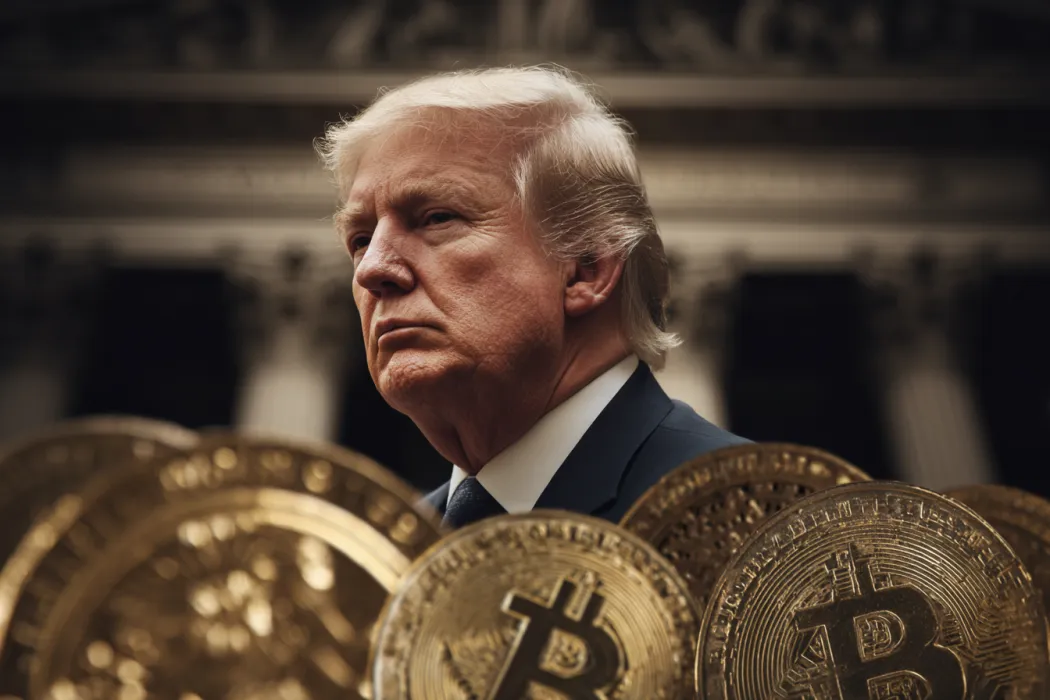Trump’s Regulators Take Center Stage: Banking Giants Clash with Crypto Disruptors
Wall Street's old guard and crypto upstarts are locked in a regulatory cage match—and the Trump administration holds the keys.
Who's winning? Depends who's funding the lobbyists.
Traditional banks cry foul as DeFi protocols eat their lunch. Meanwhile, crypto firms navigate a minefield of shifting compliance demands—some call it innovation, others call it 'regulatory arbitrage.'
The SEC's revolving door keeps spinning. One minute they're approving ETFs, the next they're slapping billion-dollar fines. Classic government whiplash.
Bonus jab: Nothing unites bankers and crypto bros faster than a common enemy—unless it's a chance to exploit retail investors.

Trump-led regulators are poised to play a significant role regarding interest and bank charter applications, a move that will shape the ongoing conflict between cryptocurrency firms and conventional financial institutions.
The Genius Act forbade issuers from charging interest to customers, but cryptocurrency businesses are looking for ways to make money off the stablecoins anyway.
Meanwhile, trade groups are fighting against plans to grant banking licenses to these businesses.
Issuers of stablecoins are required by the Genius Act to formally register their business and keep dollar-for-dollar reserves.
A Bloomberg report showed that this kicked off a regulatory procedure with US regulators having to determine how stablecoins can function like traditional banks and what it means for them to generate interest.
Instead of looking for alternatives to stablecoins that provide yields, trade groups are vehemently opposing attempts to grant banking licenses to cryptocurrency companies.
Under TRUMP 1.0, the OCC (Office of the Comptroller of the Currency) aimed to broaden the range of services offered by trust banks, with discussions suggesting that this could encompass activities such as loan issuance and payment settlement.
A number of crypto firms have applied for national trust bank charters in recent months. Among them are Ripple Labs and Circle Internet Group. This new influx of applications is a critical test of that OCC reading.
Some trade groups voiced their disapproval of the decision in July, saying the OCC should have asked for public feedback before making its final judgment. According to them, this MOVE creates a "loophole" that traditional banks can use to their advantage while trust banks can avoid regulation.
The use of these charters by cryptocurrency enterprises might have many benefits, including making them more credible and removing the need to seek licenses for operations on a state-by-state basis.
Back in March, SmartBiz set a precedent by becoming the first financial-technology company to receive regulatory approval to operate as a bank since the beginning of President Trump's administration in January, signaling that other fintechs may soon follow suit in entering the financial-services sector.
There are two possible outcomes for banks in the face of these new competitors' entry into traditional finance: increased competition and the possibility of strategic collaborations.
The involvement of traditional financial institutions with crypto companies and others increased substantially before the cryptocurrency legislation was passed.
A number of the country's largest banks have recently come clean about their partnerships with digital asset firms. Particularly noteworthy is the deal that Coinbase Global and JP Morgan Chase have reached to directly LINK consumers' bank accounts with their crypto wallets.
But traditional financial institutions are wary of the threat that the cryptocurrency industry poses since it takes a different tack when it comes to innovation.
In the wake of the banking sector's successful attempt to have the Genius Act limit issuers from giving interest to their clients, cryptocurrency startups are looking for ways to make stablecoins more financially advantageous.
Digital assets are fast becoming more popular as a payment method and as a tool for traders to enter and leave the crypto market.
In the absence of a transaction, the asset stays in an account, and businesses cannot give customers a return on their token deposits into accounts that generate income at this time.
As authorities begin to define the features of interest in this space and the boundaries that companies can operate within, organizations are looking to diversify their stablecoin holdings.
Customers can safely store their funds when they are not transacting with Circle thanks to a new partnership between the two exchanges that allows for off-exchange collateral. Coinbase, the biggest cryptocurrency exchange in the US, has put a rewards scheme in place for some customers.
However, some in the banking industry are worried that this program WOULD go against the Genius Act's no-interest requirement. Coinbase claims the program has been made to follow all the rules and regulations. The intriguing part starts with the vague and interpretable legal language.
This is where Trump's regulators could play an important role as the next leg of the conflict between crypto firms and traditional banking institutions plays out.
Decentralized, Yet Somehow Also Custodial, FinanceColumnist Jon Reiter analyzes a fundamental contradiction in the cryptocurrency/DeFi space regarding custody and regulatory exemptions.![]()

Elsewhere
Bitcoin Hits New All-Time High Above $124,000, Becomes Fifth-Largest Global AssetCryptocurrency surpasses Google’s market cap as ETF inflows and Fed rate cut expectations fuel rally![]()

![]()

![]()

![]()

![]()

![]()

Blockcast
In this episode of Licensed to Shill, host Takatoshi Shibayama is joined by Lisa Tan and Nikhil Joshi as they delve into the implications of the recently passed GENIUS and CLARITY Acts against an evolving landscape of blockchain-based governance, privacy-preserving technologies and stablecoins.
Access the episode from your preferred podcast platform here.
Blockcast is hosted by Head of APAC at Ledger, Takatoshi Shibayama. Previous episodes of Blockcast can be found here, with guests like Kapil Duman (Quranium), Eric van Miltenburg (Ripple), Jeremy Tan (Singapore parliament candidate), Hassan Ahmed (Coinbase), Sota Watanabe (Startale), Nic Young (Oh), Jacob Phillips (Lombard), Chris Yu (SignalPlus), Kathy Zhu (Mezo), Samar Sen (Talos), Jason Choi (Tangent), , Mark Rydon (Aethir), Luca Prosperi (M^0), Charles Hoskinson (Cardano), and Yat Siu (Animoca Brands) on our recent shows.
![]()
Blockhead is a media partner of Coinfest Asia 2025. Get 20% off tickets using the code at https://coinfest.asia/tickets.

